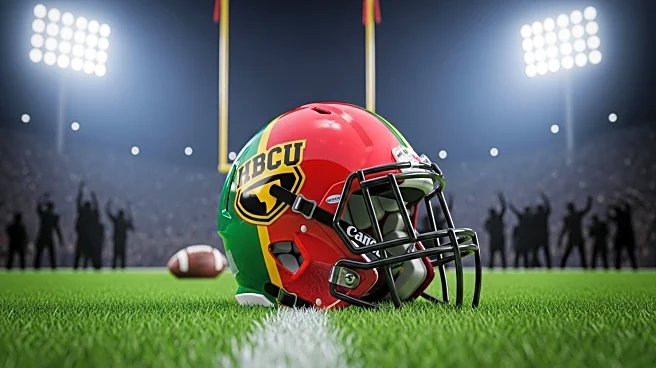What's Happening?
The first week of HBCU football has kicked off, showcasing scores and performances across various conferences including SWAC, MEAC, SIAC, CIAA, OVC, CAA, and Independents. Notable games include Towson at Norfolk State, Delaware State at Delaware, Alcorn State at Northwestern State, and Alabama State at UAB, all broadcasted on ESPN platforms. Key performances were highlighted, such as Body's impressive stats with 133 passing yards and two touchdowns, alongside a 60-yard rushing touchdown. The games are accompanied by media appearances and coverage on platforms like WWL AM/FM Radio, KCOH AM 1230, WBOK AM, and television appearances on Fox26 in Houston.
Why It's Important?
HBCU football serves as a critical platform for showcasing talent and fostering community engagement within historically black colleges and universities. The visibility provided by media coverage and ESPN broadcasts enhances the profile of these institutions and their athletic programs. This exposure can lead to increased recruitment opportunities, sponsorships, and financial support, benefiting both the schools and their student-athletes. The performances in Week 1 set the stage for the season, highlighting players who may become key figures in college football.
What's Next?
As the season progresses, teams will continue to compete for conference titles and potential playoff spots. The performances in Week 1 will influence team strategies and player development. Stakeholders such as coaches, athletic directors, and sponsors will closely monitor these games to identify emerging talents and opportunities for collaboration. The ongoing media coverage will play a significant role in maintaining public interest and support for HBCU football.
Beyond the Headlines
The cultural significance of HBCU football extends beyond the field, contributing to the preservation and celebration of African American heritage and traditions. These games often serve as community events, bringing together alumni, students, and local residents. The success of HBCU football can also impact broader discussions on diversity and inclusion within collegiate sports, encouraging other institutions to prioritize these values.









